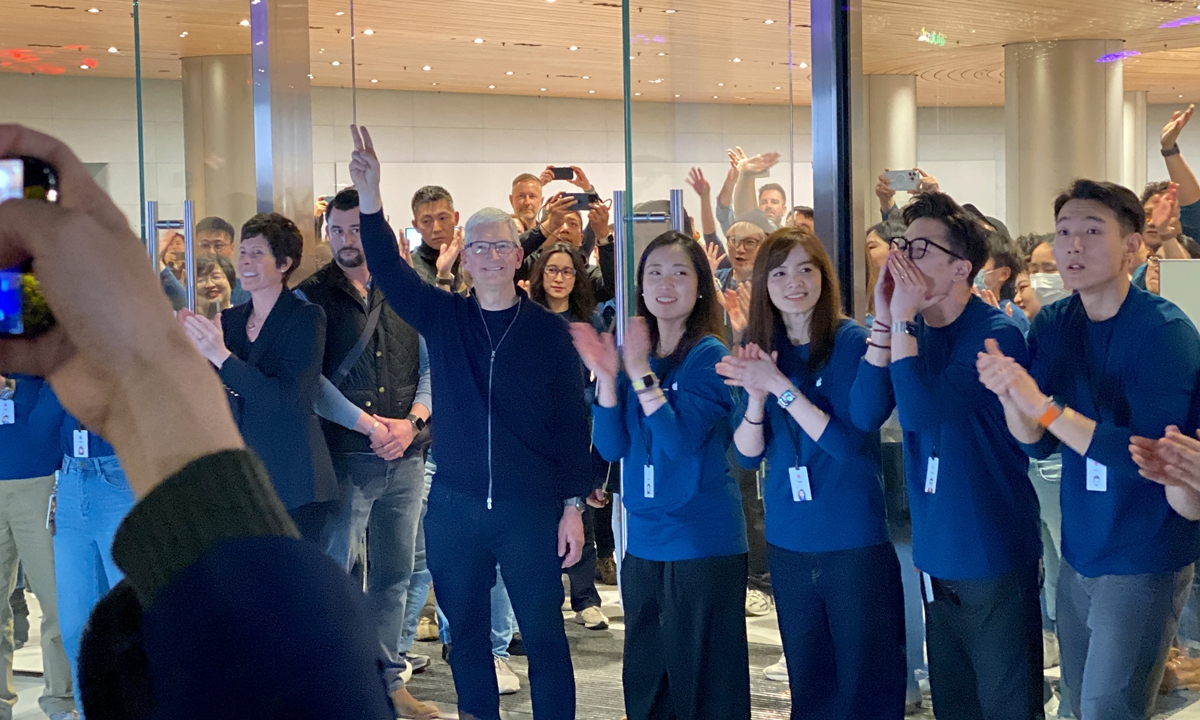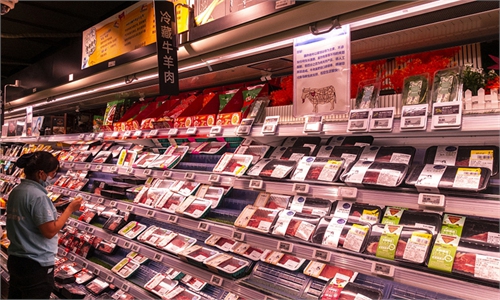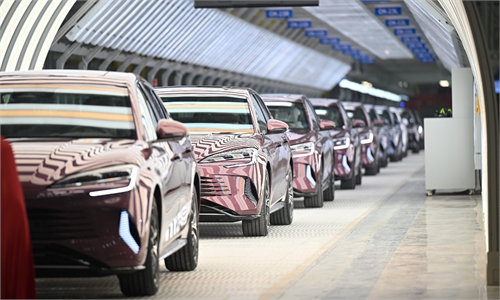IPhone sales surge in China is not just commercial success: Global Times editorial

Apple CEO Tim Cook waves to crowds as he attends the opening ceremony of a new flagship store in Shanghai on March 21, 2024. It is the second-largest Apple flagship store after the one on Fifth Avenue in New York City. Cook also took pictures with customers on site and signed autographs. Photo: Chen Xia/GT
Apple's iPhone shipments in China jumped 52 percent in April year on year, sparking widespread attention among the Western media outlets. Apple's stock price has also experienced a significant increase, a rare occurrence in the past two years. Analysts generally believe that this is due to Apple's recent sales strategy, but also thanks to China's growing consumer market for high-end smartphones. As a representative of foreign companies in China in the eyes of Western public opinion, the sales of Apple's iPhone in the Chinese market have become a weathervane to observe the economic climate in China to a certain extent.
The performance of Apple's iPhone is just one side of the overall performance of China's smartphone market. As shown by the latest data released by the China Academy of Information and Communications Technology on Tuesday, the shipment of foreign brand mobile phones in China increased to 3.495 million units in April from 2.301 million in the same period last year. This phenomenon not only maps out Chinese consumers' continuously growing demand for high-quality products, but also reveals more deeply the openness of the Chinese market and the structural improvement of the industrialization level.
In fact, China's consumer market has its own internal logic to maintain long-term stable growth. From a longer historical perspective of Apple's market performance in China, we can draw more comprehensive conclusions. Apple's journey in the Chinese market also reflects the transformation of China's manufacturing industry from "Made in China" to "Created in China." China is no longer solely an assembly base for Apple products, more and more Chinese suppliers are involved in the design, R&D and parts manufacturing of Apple products. Companies like BOE, Lixun Precision and others have become a key part of Apple's supply chain.
The Chinese government is committed to building a fair and competitive market environment, reducing market access restrictions, optimizing foreign investment laws and other policy measures to ensure that domestic and foreign enterprises can compete fairly under uniform market rules. The market share of high-end smartphones of Apple and other companies is largely attributed to their precise grasp of Chinese consumers' needs as well as their unremitting efforts in localized services and supply chain management. This has not only won these companies market share, but also brought Chinese consumers more diversified and higher-quality choices, and promoted the exchange and mutual understanding of technology and culture.
Apple has formed strong competitiveness in the Chinese market, while also to some extent driving the growth and strengthening of Chinese smartphone brands represented by Huawei, Xiaomi, Oppo, Vivo, etc. With Chinese mobile phone brands integrating core technologies such as 5G, foldable screens, fast charging technology, imaging systems, the industrial structure of China has been optimized and upgraded. This in turn has provided stronger innovation capabilities and more stable supply chain support for multinational companies including Apple.
The hot sales of Apple's smartphones in the Chinese market are a reflection of the deep cooperation and mutual dependence between China and the US in the global value chain. China, as an important link in the global supply chain, has production efficiency and cost control capabilities that are advantages that Apple cannot easily give up. Apple's success is not only due to the efficient operation of its global supply chain, but also benefits from the recognition of Chinese consumers. From multinational companies to global industries to world markets, the global value chain cooperation between China and the US in the high-end consumer market is a vivid practice of "mutual benefit and win-win." It goes beyond simple commodity exchange and rises to the strategic level of technology exchange, market sharing, and risk sharing cooperation, injecting new momentum into the stability and development of the global economy.
The strong performance of Apple's iPhone in the Chinese market is not only a commercial success, but also a vivid footnote to China's opening up to the outside world, industrial upgrading, and global value chain cooperation. It is also the inevitable result of domestic enterprises' transformation and upgrading, and the leap in technological strength. The "win-win cooperation" model of China-US cooperation indicates that an open and inclusive market environment, continuous industrial upgrading, and effective cooperation on a global scale are key elements for promoting the deepening of economic globalization and achieving mutual benefit and win-win results. In the future, as China further deepens reform and expands opening-up, the cooperation space between China and the US in the fields of science, technology, and trade will be further expanded. Both sides should meet each other halfway, inject more positive energy into global economic growth, and jointly shape a closer, more balanced, and inclusive global economic system.



